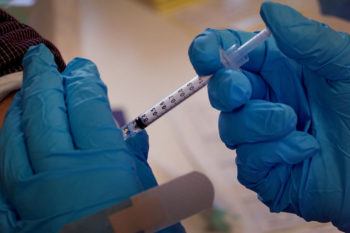Omicron Boosters, Explained

The U.S. Food and Drug Administration and Centers for Disease Control and Prevention (CDC) recently authorized updated COVID-19 boosters to further reduce the risk of severe disease, hospitalization and death caused by the more infectious Omicron subvariants (BA.4 and BA.5), which are the dominant source of infections in the United States and Texas at this time.
For more information on the new booster shots, Texas A&M Today spoke with Dr. Robert O. Carpenter, director of well-being programs for Texas A&M University School of Medicine.
What kind of protection do the new booster shots offer?
Individuals who are up-to-date with their COVID-19 vaccine series/boosters continue to be far less likely to develop severe illness, require hospitalization or die from COVID-19. These updated boosters further improve this protection against the dominant and highly infectious BA.4 and BA.5 subvariants of Omicron. We fully expect that individuals and families will benefit greatly from this added level of protection as we enter the fall/winter season of travel, holiday gatherings and indoor activities made more complex by the ongoing pandemic.
Who is recommended to get a booster shot at this point? Are there still age ranges that are given priority?
There are currently no plans for a “phased rollout” of these updated boosters based upon age or risk factors. Rather, any individual who meets criteria for a booster dose, ages 12 years and up who have completed their primary vaccine series (in other words, two doses of an mRNA vaccine) and are at least two months since their most recent dose, may receive an age-appropriate dose of an updated booster.
Who do you think needs to get these boosters? Should you get one as soon as possible?
I recommend that all individuals who qualify for an updated booster dose (12 years or older and at least two months since their most recent primary dose or booster dose) proceed with receiving an updated booster now because it takes weeks to see optimal benefit. Additionally, I concur with the CDC recommendation for receiving the annual influenza vaccine and the updated COVID-19 booster at the same time. We are entering flu season, which we expect to be the most significant in years based upon what countries in the southern hemisphere (such as Australia and those in South America) experienced over their winter. It has been shown that individuals can be infected with the viruses causing COVID-19 and influenza at the same time during the ongoing pandemic. Patients with so called “flurona” tend to do more poorly overall.
What if I just recently got a booster? How long should I wait to get the new version? In what scenarios would it make sense to wait?
If someone recently received a booster dose of the original COVID-19 vaccine, they should wait until two months have passed before getting a dose of the updated booster vaccine. There is not truly a scientific reason to forgo this added protection other than a history of allergic reaction to the COVID-19 vaccine or a true medical reason to not receive the booster as defined by your health care team.
Is it possible to time my shots for maximum protection during the holidays or other upcoming events?
To this point, protection from vaccination tends to be most strong within the initial three to five months following vaccine/booster dosing. Given the anticipated further rise in community spread and cases over the coming fall/winter months, it is wisest to receive an updated booster (and an influenza vaccine) as we transition from September into October. This will allow one’s immune response to optimize in advance of anticipated higher risk of exposure during the holiday season.
Media contact: tamunews@tamu.edu





